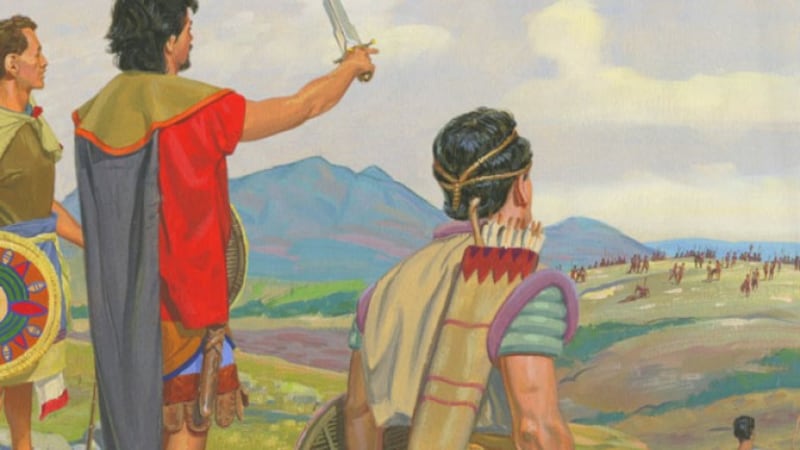This week’s “Come, Follow Me” study guide covers Mosiah 6-12, which includes Ammon’s discovery of the land of Lehi-Nephi and the start of Zeniff’s record.
Following are a few quotes from past and present Church leaders and scholars about these chapters.
Mosiah 7
“In the Book of Mormon, we read about a man named Ammon who was sent from the land of Zarahemla to the land of Lehi-Nephi to inquire concerning his brethren. There he found King Limhi and his people, who were in bondage to the Lamanites. King Limhi was encouraged by the things Ammon shared with him about his people in Zarahemla. His heart was filled with such great hope and joy that he gathered his people to the temple and said:
“’Therefore, lift up your heads, and rejoice, and put your trust in God. …
“’If ye will turn to the Lord with full purpose of heart… and serve him with all diligence of mind… he will, according to his own will and pleasure, deliver you out of bondage’ (Mosiah 7:19, 33).
“The faith of King Limhi’s people was so profoundly affected by the words of Ammon that they made a covenant with God to serve Him and to keep His commandments, regardless of their difficult circumstances. Because of their faith, they were able to devise a plan to escape from the hands of the Lamanites.
“Brothers and sisters, please consider the importance of the invitation King Limhi gave to his people and its relevance to us. He said, ‘Lift up your heads, and rejoice, and put your trust in God.’ With these words, Limhi invited his people to look to the future through the eyes of faith; to replace their fears with the optimism of hope born of faith; and to not waver in placing their trust in God regardless of circumstance.”
— Elder Ulisses Soares, April 2017 general conference, “Confide in God Unwaveringly”
“His most exemplary act, the Atonement, required Jesus to descend ‘below all things’ (Doctrine and Covenants 88:6) and suffer ‘the pains of all men’ (2 Nephi 9:21). Thus we understand the Atonement has broader purpose than providing a means to overcome sin. This greatest of all earthly accomplishments gives the Savior the power to fulfill this promise: ‘If ye will turn to the Lord with full purpose of heart, and put your trust in him, and serve him with all diligence… if ye do this, he will… deliver you out of bondage’ (Mosiah 7:33).”
— Elder Donald L. Hallstrom, April 2010 general conference, “Turn to the Lord”
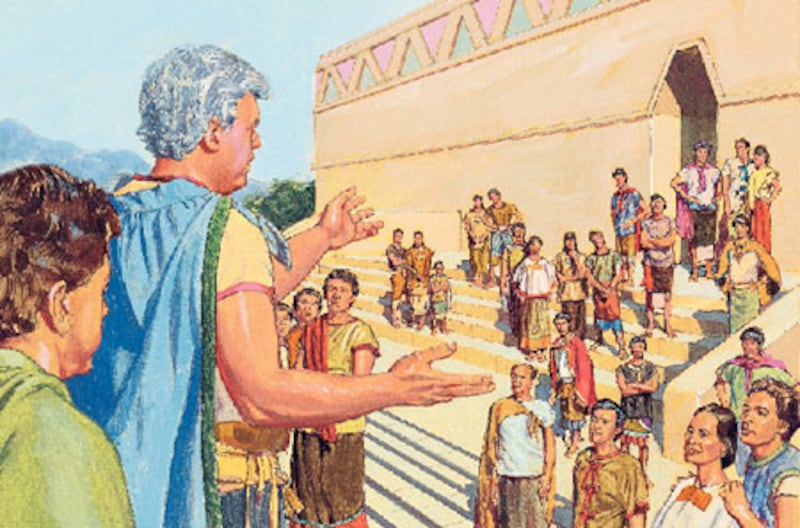
“It is one thing to look back upon the events of history. It is another to regard our own time. We have the Lord’s assurance that he will bless and prosper his people if they will keep his commandments and remember to look to him as the source of their blessings.
“On the other hand, we must not forget that these blessings are conditional. As King Limhi warned his people, ‘For behold, the Lord hath said: I will not succor my people in the day of their transgression; but I will hedge up their ways that they prosper not; and their doings shall be as a stumbling block before them’ (Mosiah 7:29).”
— Elder Dean L. Larsen, October 1992 general conference, “The Lord Will Prosper the Righteous”
“’For behold, the Lord hath said: I will not succor my people in the day of their transgression; but I will hedge up their ways that they prosper not; and their doings shall be as a stumbling block before them’ (Mosiah 7:29).
“But if ye will turn to the Lord with full purpose of heart, and put your trust in him, and serve him with all diligence of mind… he will… deliver you out of bondage’ (Mosiah 7:33).
“Our earnest prayers are answered when they conform to the will of the Lord. Since we cannot perfectly understand His will, we must walk with faith. He is all-knowing, and His decisions are perfect. The fact that our finite capacity does not let us understand all of His dealings with man does not limit Him from blessing us. His will is our best choice in life, whether or not we fully understand it. When we act using our moral agency wisely, the Lord will act according to His will.”
— Elder Richard G. Scott, October 1991 general conference, “Obtaining Help from the Lord”
“When we gain a feeling of security from loving parents as a child and continue on to experience the security enjoyed by obeying laws, we bless our own lives and the lives of others. The real issue, then, has always been where and how to find righteous security as opposed to carnal security. For our purpose here, we will call righteous security ‘spiritual security.’
“Spiritual security provides interesting advantages: you do not have to pay taxes on it, it does not change, it does not take away your liberty or free agency, and it brings positive, comforting, spiritual and eternal results. …
“Then how can we gain spiritual security? The very simple answer is perhaps too simple for too many: first, turn to the Lord. King Limhi said, ‘But if ye will turn to the Lord with full purpose of heart, and put your trust in him, and serve him with all diligence of mind, if ye do this, he will, according to his own will and pleasure, deliver you out of bondage’ (Mosiah 7:33).”
— Elder Charles Didier, April 1987 general conference, “Spiritual Security”
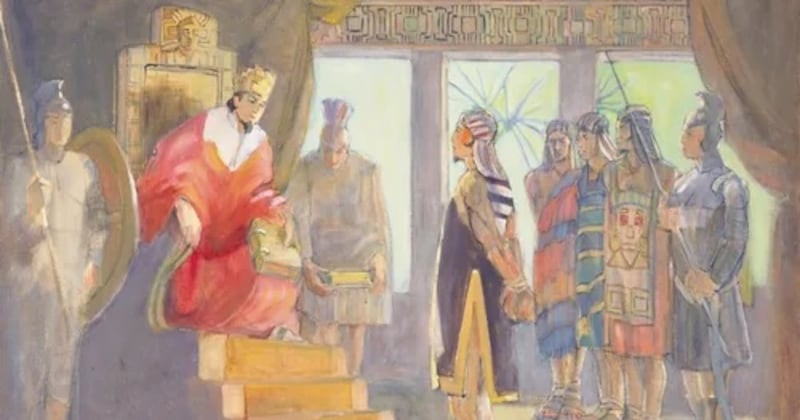
Mosiah 8
“As Ammon’s experience taught, a seer has the power to translate ancient records, and ‘a seer is greater than a prophet.’ But, said Ammon, “a seer is a… prophet also” (see Mosiah 8:11–16). Thus called, Joseph [Smith] has become ‘a great benefit to his fellow beings’ (Mosiah 8:18).”
— Elder Neal A. Maxwell, October 2003 general conference, “How Choice a Seer!”
“Through Joseph Smith’s translation came these stunning, defining and sobering words about what childlike and saintly submissiveness really means:
“‘A saint [is one who becomes] through the atonement of Christ the Lord… a child, submissive, meek, humble, patient, full of love, willing to submit to all things which the Lord seeth fit to inflict upon him, even as a child doth submit to his father’ (Mosiah 3:19).”
— Elder Neal A. Maxwell, October 1983 general conference, “Joseph, the Seer”
“We realize, as in times past, some of the sheep will rebel and are ‘as a wild flock which fleeth from the shepherd’ (Mosiah 8:21). But most of our problems stem from lack of loving and attentive shepherding.
“With a shepherd’s care, many of our new members, those newly born into the gospel, would be nurtured by gospel knowledge and new standards. Such attention would ensure that there would be no returning to old habits and old friends.
“With a shepherd’s loving care, many of our young people, our young lambs, would not be wandering. And if they were, the crook of the shepherd’s staff, a loving arm, would retrieve them.
“With a shepherd’s care, many of those who are now independent of the flock can still be reclaimed.”
— President Ezra Taft Benson, April 1983 general conference, “A Call to the Priesthood: ‘Feed My Sheep’”
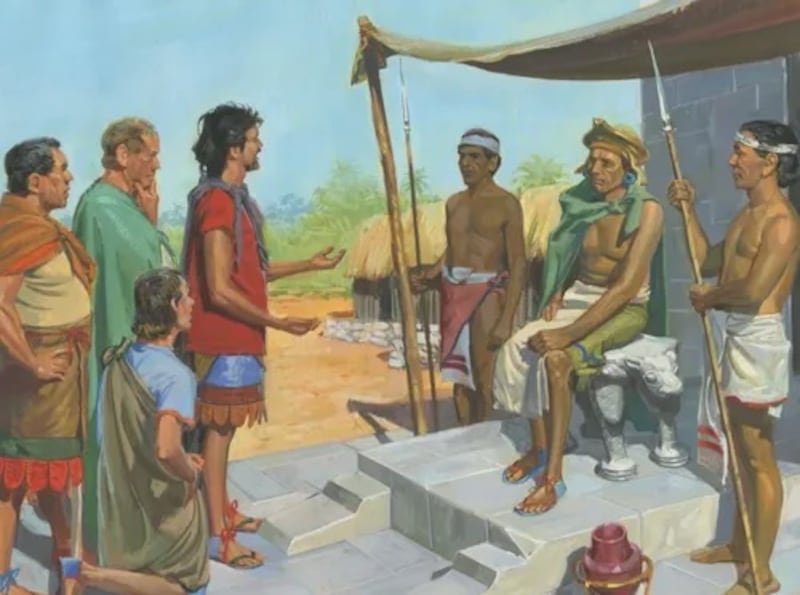
Mosiah 9
“Have you ever said or done something rash or hurtful, even in defense of the Savior or His Church? … Seek to make amends. The Savior sees our imperfect efforts to live His gospel and defend His name, even when in our weakness those efforts may unintentionally cause harm.
“When we defend our beliefs on social media or in person, we may at times become ‘over-zealous’ (Mosiah 9:3) or ‘[omit] the weightier matters of the law’ (Matthew 23:23), including mercy. We don’t use swords, but words have a powerful effect… We may find ourselves… dependent on the Savior’s mercy to heal the wounds we have caused and help us move forward, defending the faith and sharing the gospel with a ‘spirit of meekness’ (Doctrine and Covenants 100:7), replacing a spirit of contention.”
— Primary General President Susan H. Porter in the June 2023 Liahona article, “Miracles of Mercy”
“Nephi’s brothers bound him with cords and planned his destruction. Please note Nephi’s prayer: ‘O Lord, according to my faith which is in thee, wilt thou deliver me from the hands of my brethren; yea, even give me strength that I may burst these bands with which I am bound’ (1 Nephi 7:17). …
“I do not think the bands with which Nephi was bound just magically fell from his hands and wrists. Rather, I suspect he was blessed with both persistence and personal strength beyond his natural capacity, that he then ‘in the strength of the Lord’ (Mosiah 9:17) worked and twisted and tugged on the cords, and ultimately and literally was enabled to break the bands.
“The implication of this episode for each of us is straightforward. As you and I come to understand and employ the enabling power of the Atonement in our personal lives, we will pray and seek for strength to change our circumstances rather than praying for our circumstances to be changed.”
— Elder David A. Bednar in the March 2015 New Era article, “Strength beyond Our Own”
“War poses some crucial problems for the individual. What happens when a peaceful, loving and God-fearing person is trained to take the lives of others? What happens when that person enters an environment in which neither life is respected nor God revered? Can an individual in those circumstances survive spiritually?
“Answers to those questions also lie in the Book of Mormon. Several examples show that people can live righteously under the most adverse conditions. Zeniff and Gideon, for instance, were two fine men who fought in mixed armies — good and bad — and survived civil war. (See Mosiah 9:1–3; Mosiah 19:1–8, 18–24; Mosiah 20:17–22.) … Yet each remained committed and loyal to God and lived a righteous life.”
— H. Dean Garrett, former associate professor of Church history and doctrine at Brigham Young University, in the September 1988 Ensign article, “Peace Within”
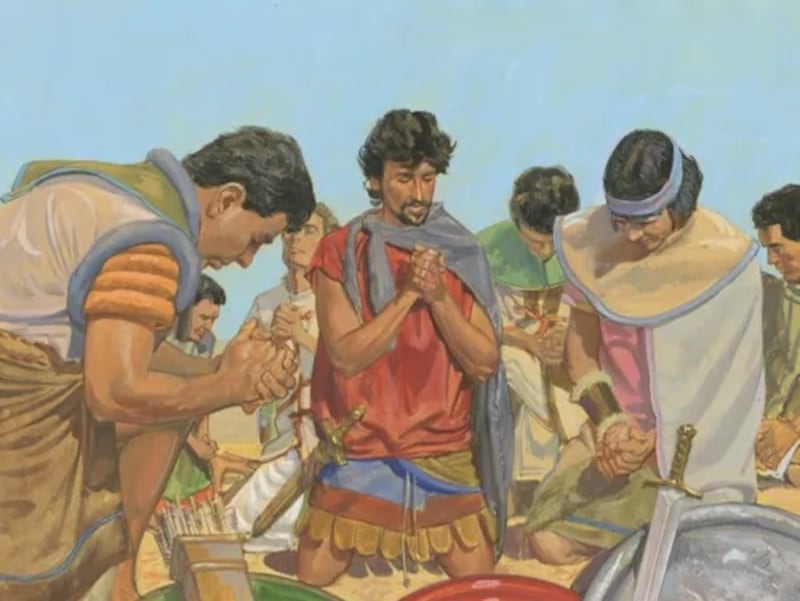
Mosiah 10
“The scriptures are filled with stories of men and women who misinterpreted ‘truth.’ In the Book of Mormon, both the Nephites as well as the Lamanites created their own ‘truths’ about each other. The Nephites’ ‘truth’ about the Lamanites was that they ‘were a wild, and ferocious, and a blood-thirsty people’ (Mosiah 10:12), never able to accept the gospel. The Lamanites’ ‘truth’ about the Nephites was that Nephi had stolen his brother’s birthright and that Nephi’s descendants were liars who continued to rob the Lamanites of what was rightfully theirs (see Mosiah 10:12; Alma 20:13). These ‘truths’ fed their hatred for one another until it finally consumed them all.”
— Elder Dieter F. Uchtdorf in the September 2021 YA Weekly article, “5 Truths about Truth”


